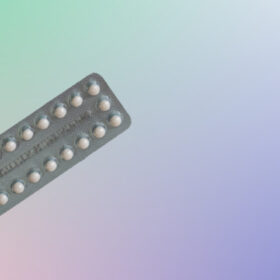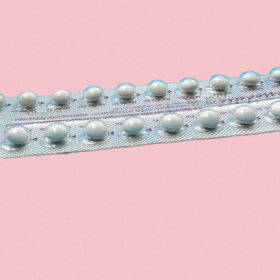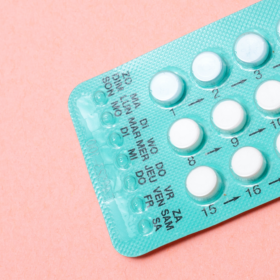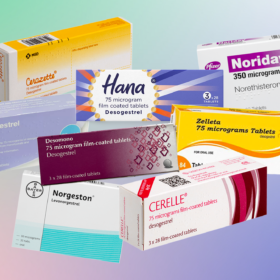
Everything you need to know – Progestogen-only pill (POP)
How effective is the progestogen-only pill?
The progestogen-only pill, better known as the progesterone only pill, mini pill or POP, is a form of contraceptive pill which contains synthetic progestogen, similar to progesterone naturally produced by the female body. It is often used by women who are unable to use combined contraception which contains oestrogen.
Designed to be taken at the same time every day, the mini pill is one of the more popular contraceptives with common brands including Lovima, Cerelle, Cerazette, Norgeston and Noriday. The progestogen-only pill is 99% effective if taken as directed at the same time each day. But, if this mini pill is taken in a ‘typical’ way, i.e not strictly at the same time each day, its effectiveness drops to 92-93%.
How does the progestogen-only pill work?
It prevents pregnancy by making the fluid in your cervix thicker (which makes it more difficult for sperm to enter the womb) and preventing the lining of your womb thickening enough for a fertilised egg to implant into it. The progestogen-only pills that contain desogestrel or drospirenone (all brands except Noriday and Norgeston) can also stop ovulation.
How do I get started on the progestogen-only pill?
If you get your pill via an NHS prescription through your GP, nurse or sexual health clinic, your doctor or nurse may check your medical history, any medicines you take and make sure that you’re not pregnant. You can also get the progestogen-only pill through pharmacies for free – The Lowdown has its very own ordering service! Our pharmacists will check your medical history through our short online questionnaire.
There are three established types of progestogen-only pill:
- Three hour traditional progestogen-only pills (Norgeston, Noriday, Micronor) must be taken within three hours of the same time every day
- Twelve hour desogestrel progestogen-only pills (Cerazette, Lovima, Cerelle, Zelleta, Aizea, Desomono, Feanolla and Hana) which must be taken within twelve hours of the same time every day
- Twenty-four hour drospirenone progestogen-only pills (Slynd) which must be taken within 24 hours of when you are due to take your pill
Pros of the progestogen-only pill
- Doesn’t interrupt sex
- Can use it immediately after birth and while breastfeeding
- Can use at any age – even if you are over 50 or are over 35 and smoke (reasons you can’t taken oestrogen containing contraceptives)
- It’s useful if you can’t take contraceptives that contain oestrogen, including the combined pill, contraceptive patch and vaginal ring
- It can stop your periods or make them lighter, less frequent and less painful
- It may help with the symptoms of premenstrual syndrome
Cons of the progestogen-only pill
- You have to remember to take a pill every day at the same time
- It may cause or worsen acne for some women
- It can cause mood changes or irritibility
- Some women find it decreases sex drive
- It can cause vaginal dryness
- It may cause irregular, unpredictable or prolonged bleeding
- Vomiting and diarrhea will impact on how the pill is absorbed into your body. If you’re sick within 3 to 4 hours of taking the desogestrel or drospirenone based pills (or 2 hours after taking Norgeston or Noriday) you’ll need to take another pill straight away and the next pill at the usual time.
Risks of the progestogen-only pill
- There is a very small increased risk of breast cancer if you take the progestogen-only pill.
- If you accidentally get pregnant while using the progestogen-only pill (which is very unlikely), there is a small increased risk that this could be an ectopic pregnancy, compared to if you got pregnant while not using contraception.
- Some research has shown that the desogestrel based progestogen-only pill can increase the risk of developing a benign brain tumour called a meningioma. This is still a tiny risk (<0.01%).
Will the progestogen-only/mini pill affect my periods?
The progestogen-only pill can affect your periods. They may become lighter, less frequent or stop altogether, which may be beneficial. They may also become irregular or prolonged or you may experience spotting between periods.
Who should use it?
- Can remember to take a pill regularly
- Can’t or don’t want to take oestrogen containing contraceptives
Who shouldn’t use it?
- Think they might be pregnant
- Don’t want their periods to change
- Take other medicines that may affect the pill
- Have unexplained bleeding in between periods and sex
- Have had heart disease or a stroke, liver disease or breast cancer
What if I miss taking a pill?
Missing or forgetting to take a pill has happened to the best of us. Check out our missed pill calculator which will help you with what to do, depending on how many you’ve missed and where you are in your pill packet.
If you have any doubt, then make sure you use alternative contraception such as a condom or don’t have sex until you’re protected and speak to your pharmacist.
Where can you get the progestogen-only pill?
In the UK, you should be able to get a free NHS prescription for the progestogen-only pill in most contraception clinics, sexual health clinics, GPs surgeries, and some young people’s services. The progestogen-only pills Lovima and Hana are available over the counter from the pharmacy (ie without a prescription). You can now access many brands of the progestogen-only pill for free through The Lowdown!
Our medical review process
This article has been medically reviewed for factual and up to date information by a Lowdown doctor.






